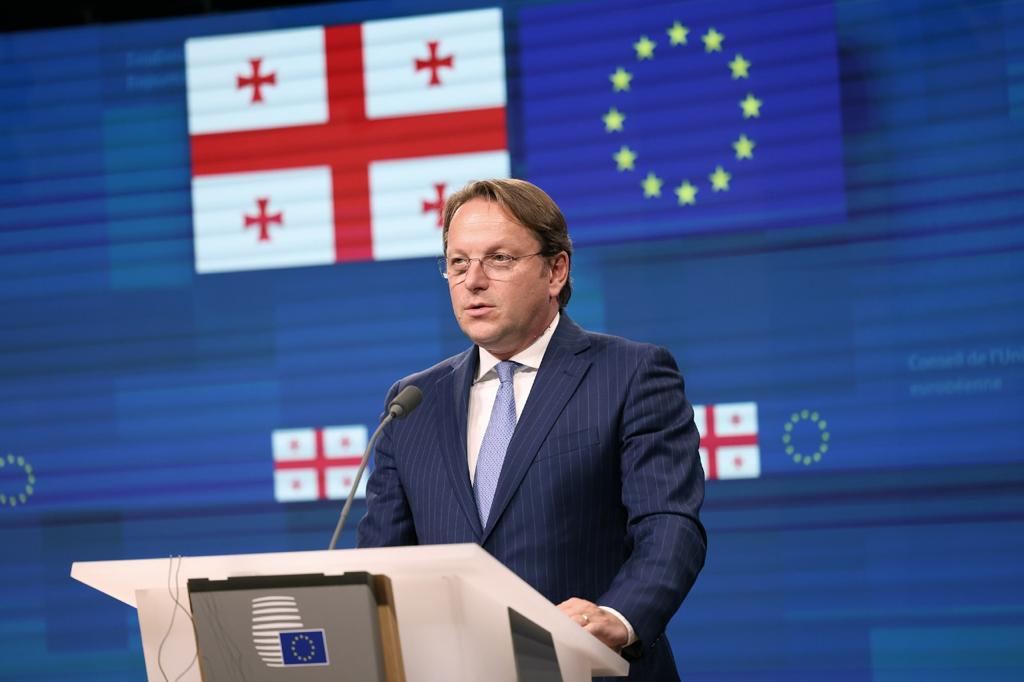
Oliver Varhelyi, European Commissioner for Neighbourhood and Enlargement, on Thursday, presented a report on Georgia following the informal meeting of European Affairs Ministers in Stockholm, Sweden.
EU Commissioner said that Georgia fulfilled 3 of the 12 priorities outlined by the European Commission.
Below is his full report as delivered:
“First on gender equality and fight against violence against women. Second, taking into account European Court of Human Rights judgments in court deliberations. And third on appointing a public defender through a transparent process. In seven other areas, Georgia has achieved some progress. These are the areas to address the issue of political polarization, to guarantee the full functioning of the state institutions, and to further improve the electoral framework, to adopt and implement transparent and effective judicial reform strategy, to strengthen the independence of the anti-corruption agency, strengthen the fight against organized crime, to strengthen the protection of human rights or vulnerable groups, and to ensure the involvement of civil society in decision-making processes.
So briefly, on the individual steps, what we see on step one, that is the political polarization, most members of the Parliament have ended their boycott of the parliament, and few laws were passed with cross-party support. To fully address this priority, Georgia needs to ensure an efficient oversight of the parliament and end the use of harsh rhetoric and honor passed political agreements, notably the one brokered by the European Union. Which is called the EU-mediated 19th of April agreement.
On step two, to get into the full functioning of state institutions and to further improve the electoral framework, the government has adopted public administration reform strategy and an action plan. The electoral code and the law on political associations were amended to align with them to the Venice Commission recommendations and ODIHR recommendations. But we still need Georgia to improve the parliamentary oversight to adequately investigate allegations of electoral malpractices as highlighted in the ODIHR reports and to reverse the electoral amendments changing the appointment procedure of the CEC Chairman, this is the Central Election Commission.
On step three, the inclusive and effective judicial reform, including the High Council of Justice, Georgia needs to submit amendments on judicial reform to the Venice Commission for a second opinion, to adopt the broader reform of the judiciary, especially of the High Council of Justice. And finally, to appoint the remaining non-judge members of the High Council of Justice.
On step four, anti-corruption. A new anti-corruption bureau was set up. To fully address this step, Georgia still needs to ensure that the anti-corruption bureau operates independently and that the Venice Commission is consulted on the draft legislation, and we would ask Georgia to reconsider its decision to withdraw from the OECD anti-corruption network.
On step six, organized crime, Georgia stepped up its cooperation with Europol and the member states. Now Georgia needs to address all the outstanding recommendations of the Council of Europe MONEYVAL.
On step eight, protection of human rights and vulnerable groups. Georgia needs to ensure that an action plan for human rights strategy is prepared in an inclusive manner, and to ensure freedom of assembly and protection for members of the LGBT QI community.
On step ten, involving the civil society and decision making processes at all level, Georgia needs to resume constructive dialogue with the civil society and implement regular and transparent consultations. In the area of de-oligarchization, Georgia has achieved limited progress in this area. The Venice Commission in its recent recommendation from the 12th of June, reiterated that the draft law should not be adopted in this current form, in this regard I welcome the announcement made yesterday and the day before by the ruling party that this draft law will not be adopted. Now Georgia has to focus on and adopt a law, setting out a systemic approach in line with the Venice Commission recommendations, including by reinforcing rules on competition policy and financing of political parties.
Finally, on media pluralism and standards for criminal procedures against media owners. Georgia has reached no progress in order to fulfill this step, Georgia needs to amend a law on broadcasting in line with the legal opinion of the Council of Europe and to ensure the safety of journalists and to raise the level of protection of freedom of journalists and media owners.”





